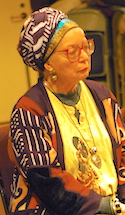Chatting with February Poet in Residence JT Stewart about her history and her work
JT Stewart is our February Poet in Residence. We've run three sets of poems by her: "Invocation", "FOLKS: 'Many Rivers to Cross'", and "SISTAHS — How We Got Ovah". Check back tomorrow for the last set in this series.

You may not know JT Stewart's name, but if you're involved in the literary arts in Seattle, you've come across her influence. She's woven into this city, threads in the plaits of literary culture, as a poet, writer, playwright, editor, teacher, performance artist and more. She's taught students at the University of Washington, Fairhaven College at WWU, and Seattle Central Community College (including yours truly), where she was the executive editor of the annual student-run literary journal Ark — a journal run on blind submissions back before such was fashionable. She's been a curator of the Jack Straw Writers Program, a board member at Hedgebrook (where there is a distinguished writer's scholarship in her name), a judge for the Governor's award and King County's Poetry on Busses, and is one of the founders of the Clarion West Science Fiction Writer's Workshop.
Stewart is a striking woman, tall and elegant, with a thoughtful, sometimes whimsical, approach to students and teaching, and a probing approach to art. Identity seems to be one of her biggest themes: her identity as a black woman with strong African influence is foundational for much of her art. I asked about her use of identity: "perhaps the best working description is 'border crossing poetry', so thank you to Rose Lemberg for helping me plus teaching me to truly understand my work." She also said that poetry has given her the kind of flexibility she needed for the "tangled complex issues of being or becoming any of the following: a woman writer, an African-American writer, a black writer, a feminist writer, a multicultural writer."
She learned her craft from musicians and artists, and considers her work performative: "I consider myself 'a voice artist'," as she puts it.
Stewart is perhaps best known as a poet and prose writer. "I use poetry (primarily non-linear) to free myself from the shapes of prose w/ its sentences, its Aristotle based logic / its punctuation rules, its grammars. With this freedom I can create / explore imagined worlds." Prose she sees as a more formal way of expressing herself, through academic papers, discussions, and letters, recalling a satisfying response to delivering a paper on Huck Finn at the Georgetown Law School.
She was a regular book reviewer for the Seattle Times during the 1980s, where she was tasked with covering books by black writers. Of the many she wrote, she says her 1987 review of Toni Morrison's Beloved stands tall in her memory.
She grew up in New York, attending the High School of the Performing Arts (when it was called the High School of Music & Art). As an undergraduate at the historically black Fisk University, Stewart studied with United States Poet Laureate (at the time he served, the role was called "Consultant in Poetry to the Library of Congress") Robert Hayden. He "introduced me to a galaxy of black history and writers" says Stewart. Graduate school took her to Wellesley, and then Fordham University in the Bronx, where she studied under her mentor Professor Charles Bernardin "who introduced me to visionary poets like William Blake, Samuel Taylor Coleridge, and playwrights like the obscure (but once popular) Reverend William Mason."
"From this rigorous scholarship. I've learned to love history - also writers who use history in their work - e.g. August Wilson and Octavia Butler. (See my poems from week one 'Invocation,' and week three 'Sunday Morning'.)
"A lot of my poetry is based on historical research. Thus I can say my poems have kissing kin relationships with history (some times real — some times imagined). And these poems usually take years to compose."
Once in Seattle, Stewart was an attendee at the 1973 Clarion West Workshop, the acclaimed intensive six-week Science Fiction and Fantasy program founded by Vonda N. McIntyre, based on the Clarion Workshop. That year, she studied with Harlan Ellison and Ursula K. Le Guin, among others, in what ended up being the last year of that iteration of the workshop.
Stewart and Marilyn J Holt were running the Science Fiction Fair in the late seventies and early eighties. Since she was teaching at Seattle Central Community College at that time, she saw the opportunity, and approached the VP of instruction and convinced him that restarting Clarion West at the school would be a smart move. Stewart, Holt, and McIntyre rebooted the workshop in 1984, setting it up as a non-profit, and it's been running continuously ever since.
About her work as a playwright, Stewart says: "I've also spent considerable time working as a playwright here in Seattle with three theaters that have shut their doors: the Alice B Theater / the Empty Space Theater / the New City Theater. My teachers included my Director Susan Finque and the Artistic Directors: Ricky Rankin, Kurt Beattie, John Kazanjian. Also I studied with two influential women of color playwrights: Cuban-American Maria Irene Fornas and African-American Pulitizer Prize Winner Susan Lori-Parks."
What's next? "I've published two short stories and have had folks tell me they are parts of a novel. Perhaps that's waiting in the wings. And - yes - I now know how it will end."
We'd like to thank Stewart for working with us, and bringing her work to our readers. We will note that we normally refuse to defer payment to poets, but at her request, we donated Stewart's payment to Hugo House, where she has taught, in her name.